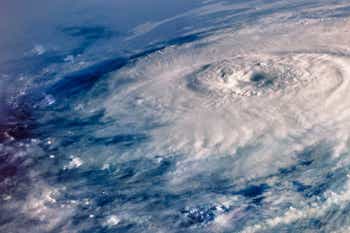Keeping you, your loved ones, and your property safe begins with preparation. Hurricanes and other strong storms can often appear suddenly, leaving little time to grab your belongings and head to a safe area. These disasters can cause high winds, flying debris, and flash flooding. If you’re in an area prone to hurricane watches and warnings, it’s important to know how to stay out of harm’s way.
“These tips from IBHS are best practices for all homeowners, but especially for those who live in hurricane zones like the Southeast,” said Mike Dawdy, director of state product management at Mercury Insurance. “By preparing your home for the upcoming storm season ahead of time, you can provide a safer environment for your family and save money if you sustain weather-related damage.”
Mercury Insurance recommends the following hurricane safety precautions when disaster is headed your way:
What to Do Before a Hurricane
Before hurricane season arrives, ensure you follow these safety tips for hurricanes:
Prepare Your Home
Before hurricane season hits, try to get your home as storm-ready as possible. Have a licensed professional inspect and prepare your roof, vents, skylights, and chimneys. They can identify any vulnerabilities and perform preventative maintenance to reinforce these areas.
Additionally, if you plan to replace your roof, consider opting for materials and installation methods that meet the IBHS Fortified Roof requirements. This standard provides enhanced protection against severe weather, helping to safeguard your home from a hurricane’s damaging effects.
Stock an Emergency Kit
FEMA recommends the following items, plus a few more from Mercury:
- A three-day supply of water (one gallon per person) and non-perishable food items
- A battery-powered or hand-crank radio (and extra batteries)
- A flashlight
- A first-aid kit
- A whistle to signal for help
- A can opener
- Blankets
- Pliers or a wrench to turn off utilities
- Mercury recommendations:
- $200 in cash, as power may be out so credit cards won’t work
- Prescriptions for you and your pets
- Three-day supply of food for your pets if you have them
Acquire a Generator
Power outages are common during a hurricane, often leaving homes without electricity for extended periods. A generator can be a lifesaver in these situations, providing essential power for lighting, refrigeration, and medical equipment. Make sure to regularly service your generator and store it in a safe, dry location. Also, follow all safety guidelines for generator use to avoid hazards such as carbon monoxide poisoning.
Review Your Comprehensive Coverage
Comprehensive auto insurance only covers damage, so do an annual checkup well before hurricane season starts to ensure your vehicle is protected.
Understand the Risks of Your Area
Extreme winds and flooding from rain and storm surges pose big risks for people living near the coast. Those who live inland may feel safer, but wind, thunderstorms, and flooding are very real risks to consider. Stay informed by setting up reliable weather information and alerts on your phone or other devices. Additionally, purchasing a NOAA Weather Radio can provide key updates and warnings, even if other communication channels fail.
Follow Instructions
If the local authorities recommend evacuation, do so quickly and safely. Don’t return until they say it’s safe to do so. You should also call your insurance company, as your homeowners policy may cover expenses incurred if you evacuate your home.
Always Keep Documents in a Safe Place
This includes copies of insurance policies, birth certificates, social security cards, important financial documents, and other identification. Scan a set of these documents and bring them with you on a flash drive. You should also consider backing them up on a cloud-based digital storage site. Additionally, review your insurance policies, document your belongings, and create a home inventory video to ensure you have a comprehensive record of your assets and coverage.
Never Try to Ride Out the Storm
Hurricanes are somewhat unpredictable and can turn or weaken at the last minute, but that’s no reason to take chances. Create a plan for your family and home, and choose someone outside the danger zone as a central point of contact. Sitting in traffic with throngs of others looking to evacuate isn’t anyone’s idea of a good time. However, it’s better to be safe than sorry. If you don’t have personal transportation, make arrangements to evacuate with someone else or take public transportation.
Evaluate Your Belongings
This will help determine what to take with you should you need to leave. Toiletries, extra prescriptions, changes of clothing, and irreplaceable items like photos and mementos are things to consider.
Turn Off Utilities Before You Leave
Be sure to turn off your gas, water, and electricity if you plan to evacuate. If you’re unable to leave, turn off your utilities if you’re instructed to do so.
What to Do During a Hurricane
If you cannot evacuate, make sure to follow these tips to keep you as safe as possible:
Ready Your Emergency Plan
Know where family members will meet if instructed to evacuate, as well as several options to get out of the city in case routes are blocked. Establish a meeting point ahead of time. Staying with friends or family living outside the local area is a good option, but also research hotels and shelters.
Reinforce Your Home
Close shutters or use plywood to board up windows and doors. Secure outdoor furniture, potted plants, and other items that may become projectiles during the storm.
Remain Indoors
If it’s too late to evacuate, stay indoors. Keep away from windows and get to the highest level possible if your home is located in a flood zone.
Head to Higher Ground
If you need to evacuate the area, go somewhere outside of the flood zone.
What to Do After a Hurricane
After the storm passes, here’s what you need to do:
Call Your Local Insurance Agent
Verify what is and is not covered if you’re affected by a hurricane. Homeowners insurance doesn’t usually cover weather-related flooding, but flood insurance is available through the National Flood Insurance Program. If you live in a high-risk area, consider purchasing a policy.
Check If Your Car is Flooded
After a hurricane, there’s a good chance your car may be flooded. Here are some precautions to take:
- Check the depth of the floodwater in relation to your vehicle
- Avoid starting your car, as this will cause more damage if there’s water in the engine
- Start drying out your car as soon as possible using a wet or dry vacuum and dry towels.
- Ventilate your vehicle by opening all your car doors
- Check your oil dipstick to see if there are any water droplets
File a Claim
Should a hurricane strike your area and your property is damaged, Mercury Insurance will have a team ready to assist its policyholders. Dawdy explains that the first step for Mercury customers is to call your Mercury independent agent and Mercury Insurance for assistance.
“In the event of any catastrophic weather event, our team will be standing by to help as quickly and efficiently as possible,” says Dawdy.
If you need to file a claim with Mercury, here’s what you need to do:
- Contact Mercury immediately about your report loss
- Be ready to provide your policy number
- Don’t move your vehicle or any debris that may be related to your claim
- Prepare a detailed inventory of any damage to your vehicle
- Provide photos or videos to your claims representative
- Keep records and receipts for additional expenses that might have been incurred and give copies to your claims representative
Mercury customers can report their loss or damage online anytime through Mercury's automated digital experience by submitting a claim at Mercury Insurance Claims or by calling the claims hotline at (800) 503-3724.
Avoid Purchasing a Flood-Damaged Car
If you don’t have a car, but are in the market, don’t buy a flood-damaged car. Here are the things you need to look out for:
- A musty, moldy aroma in the interior. Also, look for strong air fresheners since sellers may use these to help cover up the smell.
- Look for rust on screws in the console or other areas where water usually wouldn’t reach unless the car has been flooded.
- Check for rusting inside the vehicle and under the interior carpeting.
- Check the VIN and contact the National Insurance Crime Bureau to learn the vehicle’s history.
- Go for a test drive and listen for abnormal noises, such as a grinding noise from the brakes or a squeak over bumps.
- Get a pre-purchase inspection from a mechanic or dealership to ensure the vehicle is in working condition.
Conclusion
These hurricane safety tips can help your family and property stay as safe as possible when disaster strikes. It’s also important to get the right auto insurance before the hurricane to help keep your vehicle protected during a hurricane. If you’re looking for insurance, Mercury offers reliable coverage at an affordable rate.
Contact us today for a fast, free quote!


